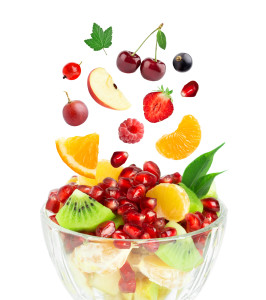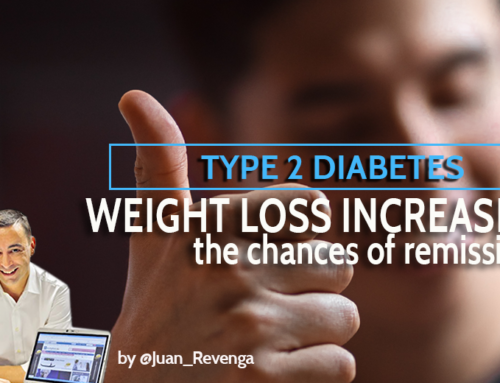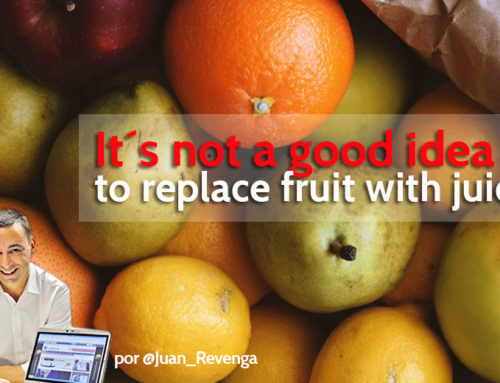A decontextualised reading about some of the current trends in dietetic research casts a shadow of doubt over the eating of fruit. Are we doing the right thing by eliminating fruit from our diet just because it contains sugar? The answer is ‘no’, and I’ll tell you why in this post.
That we should encourage the consumption of certain food groups among the general population is beyond doubt. One of these groups is that comprising fruits. However, there are people with a biased view of the situation who criminalise their consumption, given that their sugar content is one of their shared characteristics… Let us analyse this kind of reasoning. Is it true that fruits are characterised as contributors of sugar?
Fruit inside (and we don’t mean the stone)
With so many different types of fruit, and so many varieties therein, it becomes quite complicated to talk about their nutritional content given that it will always be possible to find exceptions and nuances need to be introduced for specific cases. In any case, if fruits, generically speaking, are characterised by one thing, it is for containing very few calories per unit of weight. In fact, in a subjective evaluation, 99% of fruits are below, or well below, 90 kcal per 100 grams. This piece of data is of major relevance because what we derive from it is that fruits do not have large quantities of any of the three main macronutrients (fat, proteins or carbohydrates –the generic group to which sugars belong–). These three elements are generally, the only ones responsible for providing calories to a foodstuff. In fact, the calories we attribute to whatever product depend almost exclusively on the proportion of the aforementioned macronutrients (also called immediate principles). Therefore, the most important thing, quantatively speaking, in the weight of fruits is the only possible one, water. Fruit is, in general, very rich in water and poor in macronutrients.
However, if we only take into account the three macronutrients, it is carbohydrates, compared to the other two, which stand out clearly. And among these are sugars in the form of fructose ( monosaccharide characteristic of fruit, which explains its name), sucrose ( a disaccharide formed from the union between two monosaccharides, glucose and the aforementioned fructose), glucose and then other sugars in a much lower relative proportion.
But before we take only these data into account, there are other important things to bear in mind about fruit as food. In reality it is much more that a product that contains water and sugars. That’s how we could define so-called “soft drinks”, carbonated or not, commercial “everyday” juices… or even “natural” juices, energy drinks and similar products. But not fruit. As well as the aforementioned sugar content, fruit is an outstanding source of vitamins, minerals, fibre and other beneficial phytonutrients, all of which bring about a big change in the general perspective we must have of this food group.
Consensus and recommendations: fruit should be part of a healthy life pattern
One of the bluntest and most sustainable messages for the longest period of time from the World Health Organisation with regard to this matter is clear and hard-hitting:
Take on a minimum of 400 grams of fruit and vegetables per day for the prevention of chronic diseases such as heart disease, cancer, diabetes and obesity […]
In addition, the WHO provides a series of important data:
- Sufficient consumption of fruit and vegetables could save up to 1.7 million lives a year.
- Insufficient intake of fruit and vegetables is one of the 10 biggest risk factors of mortality at a global level.
- It is calculated that the insufficient intake of fruit and vegetables causes approximately 19% of gastrointestinal cancers, 31% of ischaemic heart disease and 11% of strokes globally.
This posture is based on overwhelming scientific evidence, with numerous important studies, among which:
-
Fruit and vegetable consumption and mortality from all causes, cardiovascular disease, and cancer: systematic review and dose-response. Meta-analysis of prospective cohort studies, which concludes: “This meta-analysis provides further evidence that a higher consumption of fruit and vegetables is associated with a lower risk of all cause mortality, particularly cardiovascular mortality.”
-
Fruit and vegetable intake and risk of type 2 diabetes mellitus: meta-analysis of prospective cohort studies, which concludes: “Higher fruit or green leafy vegetables intake is associated with a significantly reduced risk of type 2 diabetes.”
-
Fruit and vegetable intake and type 2 diabetes: EPIC-InterAct prospective study and meta-analysis, which concludes: “Specific groups of vegetables, principally GLV and root vegetables, may be beneficial in preventing diabetes, while higher total FVI is weakly inversely associated with diabetes” [but never negative].
-
Fruits and Vegetables Consumption and Risk of Stroke, which concludes: “Fruits and vegetables consumption are inversely associated with the risk of stroke” [i.e., more consumption, lower risk]
Fruit yes, but juice no
Although juice manufacturers try to convince you otherwise, the benefits of whole fruit consumption do not translate to juice (whether “natural” or commercial). In this sense, there are diverse recognised sources who advise this, and to sum up it is enough to take into account the opinion of the WHO when it states that scientific data shows a probably relationship between obesity and the consumption of sugar, sugary drinks and fruit juices… compared to the protective role of whole fruit. In this sense, the recently published Dietary Guidelines for Americans for the Five-year Period 2015-20 provide us with a coherent explanation when they state that “Although fruit juice can be part of healthy eating patterns, it is lower than whole fruit in dietary fiber and when consumed in excess can contribute extra calories”. Thus, the differences in the level of satiety and calorie intake mean that fruit consumption is not comparable with consumption of their corresponding juices.
Summary
Fruits undoubtedly provide sugars, but they do not only provide sugars. The whole of its nutritional characteristics mean that, without any doubt, without any known relevant exception and without any weaknesses in the message, fruit not only can be part of a healthy eating pattern, but they must be part of it, both for its multiple benefits, as well as because its proper consumption leads to the relegation and exile from our diet of other superfluous and unnecessary products.
By Juan Revenga, dietician-nutritionist and biologist
Latest posts by Juan Revenga (see all)
- New hopes of a cure for type 2 diabetes - 16 September, 2016
- Hydration, calories and diabetes: a dangerous triangle - 19 July, 2016
- The myths of breakfast (or the “most important” meal of the day) - 22 June, 2016











Thank you for your reflections, Juan.
I notice that in all your references to “scientific” evidence and recommendations for the WHO, as well as embedded in your blog, you cite fruit and vegetables always together…”fruit and vegetables”. I wish you would separete them in your reflections and writings. Fruit are not the same as vegetables!! and their impact on health are quiet distinct!